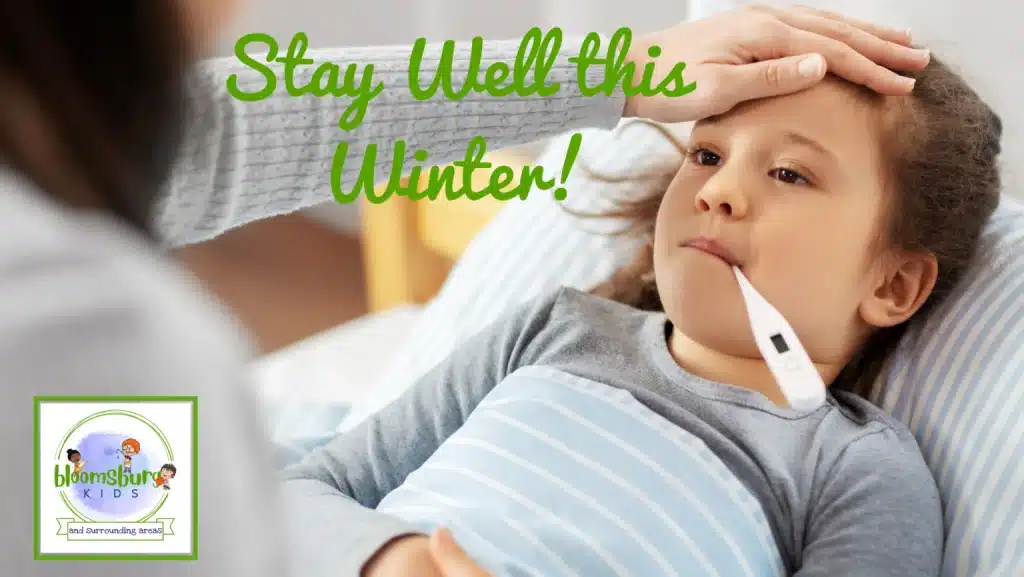With all the festivities at school and at home with friends and family- coupled with being indoors much more in the colder weather- winter is often full of illnesses, especially with littles! In hopes of helping parents get through the holiday season and the rest of the winter months, we sat down with the very knowledgeable Dr. Laura Spahr from Geisinger Bloomsburg Pediatrics. She has outlined lots of helpful tips and tricks to help you deal with sicknesses and ( fingers crossed) stay well!
Now that “sick season” is officially in progress, as a pediatrician I get ready for the most difficult time of the year when kids seem sick all the time. Here are a few guidelines and tips that I hope can help you to know how to help your child at home, and when to be more concerned and take them to the doctor. These recommendations are intended for individuals that are vaccinated, healthy, and without underlying chronic medical conditions or suppressed immune systems. Hopefully these tips will give you a start on how to approach illnesses this “sick season” and that more healthy days are ahead than sick ones! (The views expressed herein are mine alone and do not represent Geisinger.)
Dr. Spahr, DO
My Child is Sick – When Should I be Concerned?
“I hear often, “my child is sick all the time,” especially starting in about September, and for good reason – young children especially those in daycare or attend school are sick literally 10-14 days out of each month from September through about late March/early April. It is exhausting for the child and for the parents and just plain awful. Viruses cause multiple illnesses through these months and it typically takes 10-14 days to get better, and then the child picks up another virus. Know that this cycle is normal for this time of year and as long as your child has a period of wellness in between these episodes; it is to be expected.”
When to Worry
Here are some symptoms that should prompt you to have your child seen right away in the Emergency Room:
Trouble breathing – A child will appear frightened if they are not getting enough air or can’t catch their breath, may gasp, wheeze, have a much faster breathing rate and appear to be working to breathe. If a person is not getting enough oxygen, they may have blue to purple color around lips/skin or look very pale as well.
Concern for dehydration – Unable to keep fluids down and not passing urine at least every 6-8 hours, no tears with crying and dry inside of the mouth.
Unable to swallow/drooling – (not just a sore throat with eating/drinking, but much more severe that you can’t swallow your own saliva easily).
Lethargy – not just being tired but we will sometimes describe this state as being like a “limp like a dishrag” with no energy.
Passing out or nearly passing out – if the child seems confused or “out of it”.
Seizure or concern of possible seizure.
Severe headache accompanied by stiff neck, fever, with or without a rash.
If your child is an infant with rectal temperature 100.4 or higher and is less than or equal to a month of age.
When to Make a Regular Doctor’s Appointment
“When should I go to the doctor’s office with my regular physician and NOT go to the Emergency Room? We know it is frustrating to not be able to get in to see a doctor right away but know that we are taking into consideration many patients when we make appointments and try to get the children that need to be seen first in first and if it sounds like symptoms can wait a bit, your child may be scheduled in a few days. In fact, it might help to give the symptoms a few days because things may get better on their own.“
Some standard symptoms for a routine doctor’s appointment:
If the cough and congestion are not improving in 10-14 days or if the symptoms are getting worse instead of better, especially after 5-7 days. Usually, the symptoms will be mild at first and then peak mid-way through and then slowly get better in time. It is most rough during the middle of the illness because this is when you feel the worst and think things should be over, but really you are at the peak and will just need more time. Also know that if things are overall better in 10-14 days but you still have a little cough, even one that produces a little phlegm can linger for a few weeks after an illness. The cough should just be here and there though and definitely much better overall.
If your child has a wheeze but is not struggling to breathe.
If your child has a fever for more than 4-5 days in a row.
If your child has a sore throat that is persistent after a couple days, but is able to drink fluids and urinating at least every 6-8 hours.
If your child has a rash that you are not sure about with an illness that is not associated with any signs needing emergency care.
What is a Fever and When Should I Worry?
“Oh boy! This question gets asked all the time – by definition a fever is 100.4 F or 38.0 C; it is most accurate to take the temperature rectally in a young child, but no matter where you take the temperature this is the number we go by to define a fever. Even if you “run high” or “run low” with your temperature, the number to define fever is the same. There is no number that I give to parents in terms of fever to go to the ER; I depend more on how the child is doing with other symptoms and how they look to the parents.
We are taught very early on in our medical training that a fever is a good sign that the body is doing its job to fight infection and normal during illness. The reason we treat a fever is because it is uncomfortable. I’ll say that again – the reason we treat a fever is because it is uncomfortable. Medication like Acetaminophen or Ibuprofen is meant to last for a certain amount of time and if your body is working to fight the infection the temperature will go back up again. This is a good sign that again, your body is doing its job. Once the fever is consistently down on its own without fever reducing agents the body is telling us that the infection is going away or gone and the immune system has done its work. Febrile seizures are a worry for parents and are terrifying, but are generally isolated episodes and not dangerous. If there is a history of febrile seizure in the child or family treating a fever is recommended but overall the only reason to treat is to give the child comfort.“
What Can I do to Help During Times of Illness?
Rest – Let the body rest if it needs to and if a child needs to sleep more, let them.
Fluids – Especially if a child has a fever the fluid requirements increase and it is important to push give small, frequent amounts of water, Pedialyte, dilute juices, and solids as tolerated.
Saline nasal spray – To loosen secretions followed by nasal suction or nose blowing before eating and bedtime. Also, Neti Pot or nasal saline rinses can be used to target congestion in older kids who can use this especially before bedtime to help with sleep.
Honey to help suppress a cough – You can use 1 tsp or more alone or in a warm fluid and is as effective as cough medicine without the side effects. Honey can ONLY be given to kids older than 1 year of age due to the risk of botulism.
Warm salt water gargles – to help soothe your throat several times a day.
Tylenol or Ibuprofen – As directed by the label or your doctor for fever and/or body aches. Be careful if you do choose to take an over-the-counter medication that it doesn’t also contain these to be sure you don’t take too much medication.
Typically we do not recommend over-the-counter cold medications in kids 6 or younger, but older children can consider over the counter cough suppressants. Decongestants are usually not recommended until age 12 or older.
How Can I Prevent Sickness?
Wash your hands – A LOT.
Get vaccinated – I know this is a tough one in our current climate of controversy with vaccines, but I will tell you from my own experience and my medical knowledge that they are literally life savers.
Wear a mask if you are in a high risk situation with many people during times of peak illness – it was amazing to me how few people we saw get sick when we were masking and staying home. Of course, the downsides to social isolation are many and this is not a solution, but if you can avoid large crowds or situations where you think may be higher risk try to do so.
Don’t smoke ANYTHING – Remember too that your kids will do what you do, not what you say. I hate to say it, but most kids who have parents that smoke (even if just outside, not around them) end up smoking. You are the most important factor in determining if your child will smoke someday and it definitely will affect your health now as well.
Stay home if you are sick to help prevent spreading illness.
We hope this information was helpful and reassuring for parents; we all know what its like to scramble around panicked when our kiddos feel sick! Wishing you cheerful, happy, and HEALTHY holidays from our Bloomsburg Kids families to yours.

